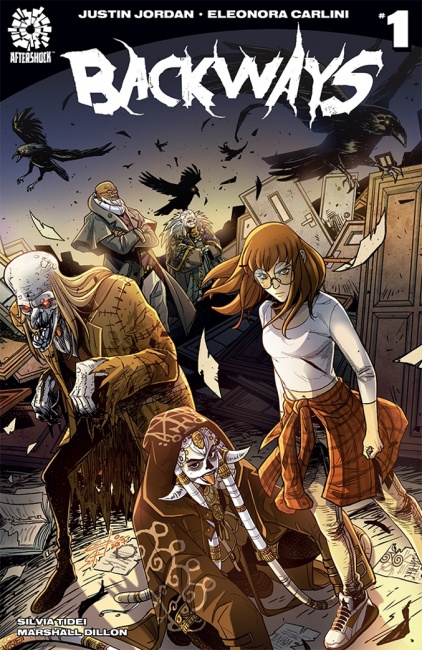What is your perspective on the overall market conditions?
Mike Marts: Looking at the industry the past few years, we're in the midst of a comics renaissance without even actually knowing it. There's so many different factors at play here, traditional, mainstream comics versus the increasing interest in creator‑owned comics.
You have publishers reacting to social justice issues and things like that. So many different things going on right now that the end result of all that is you're getting such fantastic work out of the creators that a lot of people in the middle of it don't actually realize that we're in the middle of this new, creative renaissance.
There's so many different, new factors at play these days whether it's the digital aspect of comics or the constant influx of new creators. It's really tough to tell where things are going to go from here.
A creative flowering. You feel like the market's very receptive to that creative flowering?
Marts: As more consumers, readers, and retailers have responded to creator‑owned, the answer's yes, definitely.
More and more readers are following specific voices and specific ways of telling stories from creators as opposed to the more traditional ways of picking up comics in the past, which was picking up from one or two companies and being loyal to those one or two companies or a specific group of characters.
Joe Pruett: To add on to what Mike was saying, I think right now that retailers and fans are more receptive to new ideas as opposed to the same‑old, same‑old that's been going on for quite a long time, new ideas, new creators, new voices, diverse stories, diverse creators.
One of the hot topics out there is variants and their impact on the market. Do you use them; what are your thought on their use?
Marts: We have, but we've done it in a limited capacity. Usually, we do just one variant for a number one issue. As a young, new publisher we're feeling it out and seeing what the limits and thresholds are with retailers and readers, and how much patience they have with variants, and how much they actually want them.
For the first few years, we really just kept it limited to a single variant for number‑one issues. Then, of course, we've done other things like special variants for specific conventions or specific retailers.
Pruett: First of all, we want the comic issues, the stories to sell book and not the gimmick.
You launched about two years ago. Is this about where you expected to be two years in?
Marts: We knew where we wanted to begin with a small group of titles from some prominent artists and writers. We've grown beyond that in ways that have really pleased us and have allowed us to think beyond what we initially set out to do.
Pruett: I agree with Mike. We've always wanted to do a slow, steady growth and not over commit our resources. We'd rather stay small and keep the quality control and just let it grow naturally.
How have your book sales been? Are you getting most of your collection sales in the direct market, or are you getting sales in the bookstores too?
Pruett: The first year we actually only allowed our trade sales to be in the direct market before we branched out to the book market. I would say right now the direct sales have been very strong for us. The book market zone is a growing segment of it, but our sales are actually pretty solid across the board.
Are you getting chain pick up on a good percentage of your titles?
Pruett: Yeah, we are. We're getting Barnes & Noble, Books‑A‑Million, etc.
What are your biggest sellers?
Marts: Babyteeth has certainly been our strongest series in terms of single‑issue sales. The number one issue was our biggest success, and then Animosity overall as a series has been our most consistent, strongest seller.
How was Aftershock funded, and is it financially successful?
Marts: As far as what we can share, most everything has been handled internally as far as what we do in financing and the making of the comics, putting them together.
Like any new company, we've been experimenting with different things. Certain models that we've used on titles have worked, and others have not. As we've been going along, we've been refining the process and really streamlining how we put a comic book together and how the deals with the creators are arranged.
In our second year, we've seen even more progress and more success than our first year. The critical acclaim on all of our titles and all of our launches really exceeded any expectations. We've been careful with each new product that we do that we're very specific in our estimates and what type of readership we think our projects are going to reach.
Pruett: The answer to your question is that we're in this for the long haul. We're not here to get our feet wet and walk away. Our focus is not to make film and TV primarily. Our focus is to be a publishing company. That's what we love doing. We're not walking away anytime soon.
When we talk to retailers about your titles, they tell us that the people that buy your books like them, that the retailers themselves like them. They're trying to figure out ways to make them more visible. How do you think you can achieve that, getting your books higher visibility?
Pruett: One way is I'm in the middle of a nine‑month North American tour. I'm visiting retail stores myself as the publisher for the company, and I go to the stores.
Part of my background is I worked book retail myself for seven years with Borders and Barnes & Noble. I spent another couple years as the merch expert for the Atlanta region for Borders where I've gone to stores and helped figure out how to get things seen.
I've been working a lot of the retailers, and for each store, it's different. I work in a different way and figure out what can we do to work together to make our titles visible and create sales. That's one way we're doing it.
What's the reaction been to that?
Pruett: It's been fantastic, actually. I've already visited 60‑70 stores since July, and I'm doing this through March. I got a ton more, probably another 50 or 60 lined up, coming up soon. It's been great. Every time I go into a store, it's, "Thank you for being here. I love to hear ideas." We're implementing the specials we've had and put them together and see how they work.
Marts: We found that the personal touch that Joe uses in visiting these stores and the personal hand selling makes a big difference in terms of sales for us. Even a few store visits can result in a small percentage of sales. For a young company, it's great for us.
What Aftershock releases coming out in the next six months or so are you most excited about?
Marts: We've got our second collaboration with Justin Jordan, a book called Backways that launches in December. We're extremely excited about that. Justin's created a whole world of magic and different creatures. It's definitely going to appeal to fans of Harry Potter and Chronicles of Narnia.
We're seeing great success with Jimmy's Bastards, which is our second project with Garth Ennis. That's going well into 2018. We're working on the second volume of that.
Pruett: That relationship continues to grow.
Marts: The continued success of books like Animosity and Babyteeth; partnering with both Donny Cates and Marguerite Bennett has been fantastic for our company. We're excited about the future of both of those titles.
Pruett: Then Cullen Bunn's worked with us as well with Dark Ark and Unholy Grail.
Marts: They did great.
Pruett: They're a big success, and so we look forward to seeing that relationship into 2018 as well.
You're doing about 10‑12 books a month. Is that right?
Marts: Yeah, that's right. That's been our average for the past year or so. We don't really see any reason why it's going to dip down below or rise any higher. It seems to be a nice sweet spot for us, for the readers, and for the retailers. It's enough for any one store or any one customer to pick up in any given month.
Do you feel like you're getting line customers who are buying multiple Aftershock books? If you like one Aftershock book, will you like another, or are they so different that you're hitting different parts of the audience with different books?
Pruett: No, I definitely think we're getting the line purchase customers. We're small enough where you can sample our line every month and not break the bank. People are buying, or if not buying every single title at least trying, every single title.
Anything else you want our readers to know?
Pruett: I just want them to let them know that A, we're here to work with you as our partners in this company. Anything we can do to help you, to let us know. If you're interested in us coming to visit you at your shop, let us know that. We'll make plans to do so. We're basically here to grow our company with you.
Marts: Along with that to the retailers, a reminder that we are on FOC. We have an emailer that goes out several times a month with full PDFs of advance books. We have a Facebook retailer forum. They can all join if they haven't already. If there's any interest in personal visits from Joe or other members of our staff to definitely inquire.





